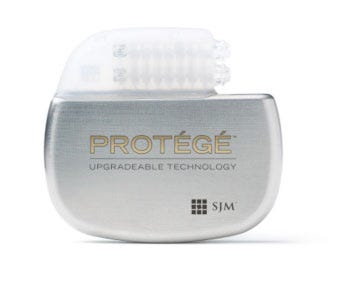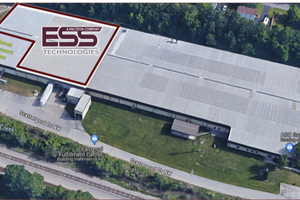St. Jude's Upgradeable Neurostimulator Gains FDA Approval
April 7, 2014
|
|
St. Jude Medical (SJM) has announced that it has received FDA approval for its Protégé implantable pulse generator (IPG), which the company says is the first such device to be approved that can be upgraded after implantation.
The Protégé's software can be wirelessly updated as new therapies, stimulation modes, diagnostics or other improvements are approved by FDA. Until now, patients had to have their medical device surgically replaced to gain access to the latest technologies. Protégé remedies this, allowing patients to access future innovations and therapies once they are approved without the cost and risks associated with surgical replacement.
SJM says that Protégé is the world's smallest neurostimulator. It employs spinal cord stimulation (SCS) techniques to treat chronic pain of the trunk or limbs, and pain from failed back surgery. Projected battery life for the device is 10 years. SJM has open-ended the device's longevity by not incorporating an automatic shutoff.
Timothy Deer, MD , an interventional pain physician, president and CEO of the Center for Pain Relief in Charleston, WV, and president-elect of the International Neuromodulation Society, was the first physician to implant a Protégé system. "With its upgradeability, SCS patients can readily access newly approved stimulation methods, allowing the latest technology to be synced with their medical device. This will reduce additional surgeries and lower the cost of care," Deer said in the release announcing the launch of the Protégé system.
An IPG, commonly known as a neurostimulator, is prescribed for patients who suffer from chronic pain. According to SJM, chronic pain affects 100 million Americans, more than heart disease, cancer, and diabetes combined. This debilitating affliction is said to be the cause of 40 percent of work absences, second only to the common cold at 50 percent. Back pain reportedly costs the nation more than $635 billion each year in medical treatment and lost productivity.
SCS is a proven therapy that has been used to help manage chronic pain and improve patients' quality of life. "In the first 40 years of SCS we've seen advances in hardware but limited progress in software and programming," Deer said. "This new device evolves with promising therapies."
Stephen Levy is a contributor to Qmed and MPMN.
About the Author(s)
You May Also Like



